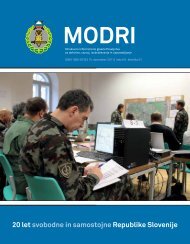Letnik 9/2, september 2007 - Slovenska vojska
Letnik 9/2, september 2007 - Slovenska vojska
Letnik 9/2, september 2007 - Slovenska vojska
You also want an ePaper? Increase the reach of your titles
YUMPU automatically turns print PDFs into web optimized ePapers that Google loves.
NESLIŠNO OROŽJE: RAZVIJANJE OBVEŠČEVALNEGA SODELOVANJA V ...<br />
The world of counter-terrorism as it has evolved since late 2001, however, places<br />
bilateral operations in a different position, especially for the United States. Baldly<br />
put, the CIA (and, indeed, any intelligence service in the world, taken alone) lacks<br />
the international reach and capacity to successfully target individual terrorists or<br />
terrorist cells without regard to where they may be. To be sure, the CIA can, and<br />
probably does, conduct effective counter-terrorist actions on its own in select<br />
areas outside the United States. Nonetheless, there are important arenas where<br />
it would be difficult if not impossible, by any reasonable measure, for CIA or<br />
other U.S. operatives to conduct inherently risky, intrinsically complex counterterrorist<br />
operations successfully, absent the support or at least the acquiescence<br />
of the local intelligence service. There are a multitude of reasons for this. Most<br />
U.S. intelligence officers are not able to “blend in” to environs such as North<br />
Waziristan in Pakistan, rural areas of Yemen or even the more cosmopolitan venue<br />
of the United Arab Emirates. Indeed, while trained U.S. intelligence officers can<br />
doubtless move comfortably throughout Europe, Latin America and other areas,<br />
they are nonetheless most often betrayed by their ethnicity or, more precisely,<br />
their lack of ethnicity appropriate to the area they are inhabiting, temporarily and<br />
operationally. With few exceptions, a CIA Case Officer speaking solid French will,<br />
nonetheless, not be taken for a native by the habitués of Brest; the officer uttering<br />
precise High German may find it difficult to inconspicuously rent an apartment<br />
in alias in the dialect-ridden valleys of alpine Bavaria. These difficulties multiply<br />
considerably in the Middle East where tribe, family and tradition dictate all, among<br />
populations endemically suspicious of outsiders if not impulsively hostile to them.<br />
In short, expecting unilateral actions to succeed against terrorists in such locations<br />
would be setting the bar high indeed. The odds for success can however improve<br />
markedly with the inclusion of the host-country intelligence service as an engaged<br />
local partner.<br />
What exactly can a cooperative and competent liaison service bring to counterterrorism<br />
operations In theory, a great deal. In practice, this will depend in<br />
each case on the level of cooperation and transparency achieved in the bilateral<br />
arrangement. It is perhaps instructive to here consider the nature of the terrorist<br />
target. Terrorist organizations are of their nature clandestine entities operating<br />
in a covert demimonde. And like politics and real estate, all terrorist structures<br />
are local and deal with location – that is, they have cells in real physical places.<br />
Terrorist infrastructure involves safe houses, hotel rooms rented in alias, phone<br />
booths and cell phones, internet cafes and similar things. Individuals involved in<br />
86

















